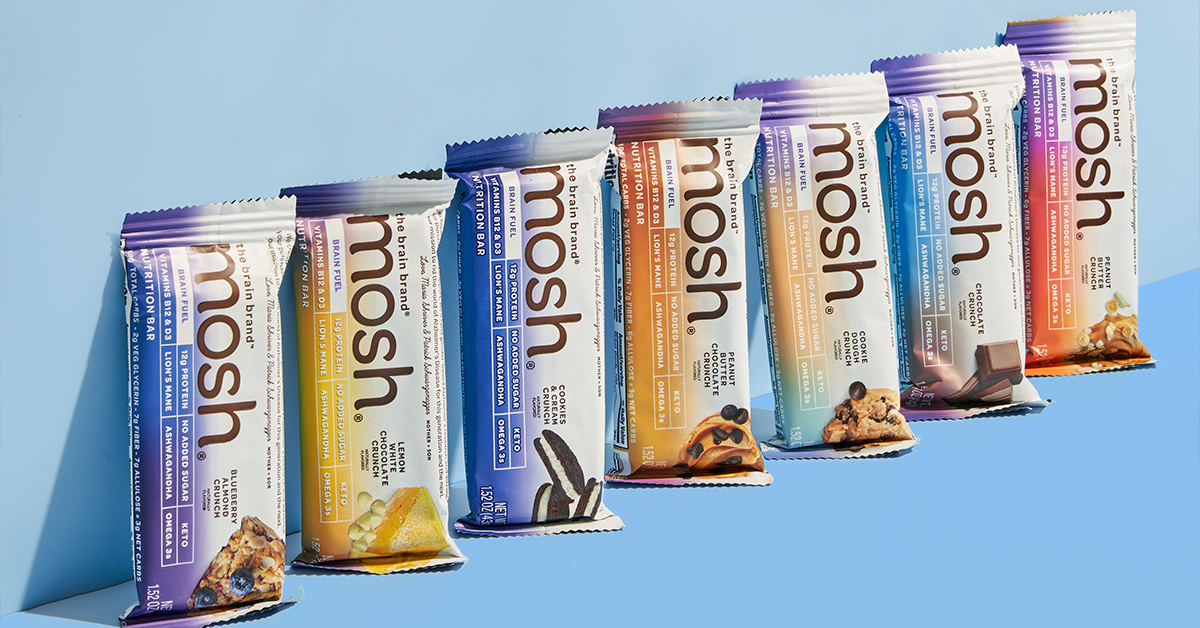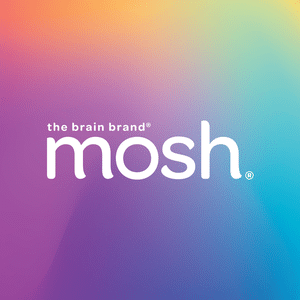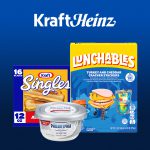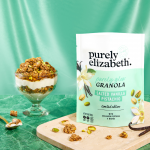MOSH Makes $3M Move Towards Retail Launch

Brain health bar brand MOSH has raised $3 million with eyes on steady expansion into brick-and-mortar retail over the next two years.
Founded by mother-son duo Maria Shriver and Patrick Schwarzenegger in 2021, the bars have been sold exclusively direct-to-consumer up until this point, which Schwarzenegger said has allowed MOSH to operate a lean team with low operating costs as it garnered its initial proof of concept.
“After almost two years, we’ve done over $10 million in direct-to-consumer [sales] and [over that time] we’ve had a lot of people knocking at our door to invest,” said Schwarzenegger. “We brought some friends and family money in about a year ago, but, if we really want to grow this company, we knew we had to take in a check from someone that’s really going to put some gas on the fire.”
The round was led by clients of Main Street Advisors (MSA), an asset management firm that has invested in an array of food and beverage businesses including Blaze Pizza, Dave’s Hot Chicken, Kate Farms, MaryRuth Organics, Mendocino Farms and TRUFF. The round also saw participation from Joyance Ventures and Entrepreneur Ventures.
MSA was founded by Paul Wachter, who once managed the blind trusts of Shriver and her ex-husband, former California Governor Arnold Schwarzenegger. Wachter also served as Gov. Schwarzenegger’s key advisor and strategist during his campaigns.
MOSH currently sells a 7-SKU line of lion’s mane and ashwagandha-infused protein bars with flavors ranging from Cookie Dough Crunch to Blueberry Almond Crunch. Online, a 12-pack of bars sells for $43.99. Schwarzenegger said bars are just the beginning for MOSH’s brain health-focused lifestyle platform brand.
The mission-driven brand has already raised “six-figures” for Alzhiemer’s research, said Schwarzenegger, which is a key component to its commitment to creating a brain health platform. The five-year vision for MOSH includes multiple product lines including powders, supplements and snacks that fall under the umbrella of its chosen function and the newest product line is set to launch in late September.
“One of the things that we’ve really learned from our consumers is that if it’s not good tasting, if it’s not cool and it doesn’t make them feel great – they won’t purchase it – no matter how efficacious or amazing the product is,” said Schwarzenegger. “So there’s a fine line to balance: trying to make it scientific, trying to make it ‘food as medicine,’ while trying to meet the consumer at a lifestyle point.”
As the brand continues to build toward that “north star” positioning, it has also used the new capital to reinforce its team, including adding Hannah Marchese as digital marketing coordinator and Josh Person as a field representative. Marchese and Person are both well-versed in the CPG food world with the former previously working for Kalumi BEAUTYfood bars and the latter currently also working as Owner/CEO of industry community platform Foodboro.
The new hires bring MOSH’s head count to six full-time employees, excluding the two co-founders. Scaling with a lean team has helped keep operating costs low, according to Schwarzenegger, who said the business is “doing over a million dollars per employee, which is over two or three times the industry standard for CPG [labor costs].”
He said if the business dialed back marketing spend, stuck to DTC sales and operated with a team of only two or three “it could be profitable tomorrow.” But, at a time when many CPG companies have shifted from a “growth at all costs” mindset to focus on profitability, MOSH believes it can strike a balance between the two camps.
“We were really cautious and careful about where we spent our money and how we spent it,” he said.
He plans to maintain that cautious mindset as the brand makes its next major move toward retail. Schwarzenegger has set a two-year timeline for the retail rollout and noted the new capital will help buoy the brand as it navigates slotting fees, customer acquisition spend and other expenses associated with moving into retail. MOSH plans to enter initial doors next year and by 2025, expand to a point where brick-and-mortar revenue eclipse DTC sales.
“We want to be in 10 to 15,000 doors in three or four years,” he said. “We want to be getting every consumer to think about brain and body health. In order to grow into that landscape we will be losing money. I would say by 2025 we will be profitable, but for the short term, it’s an opportunity cost that we need to lose money to get to where we want to go.”

















